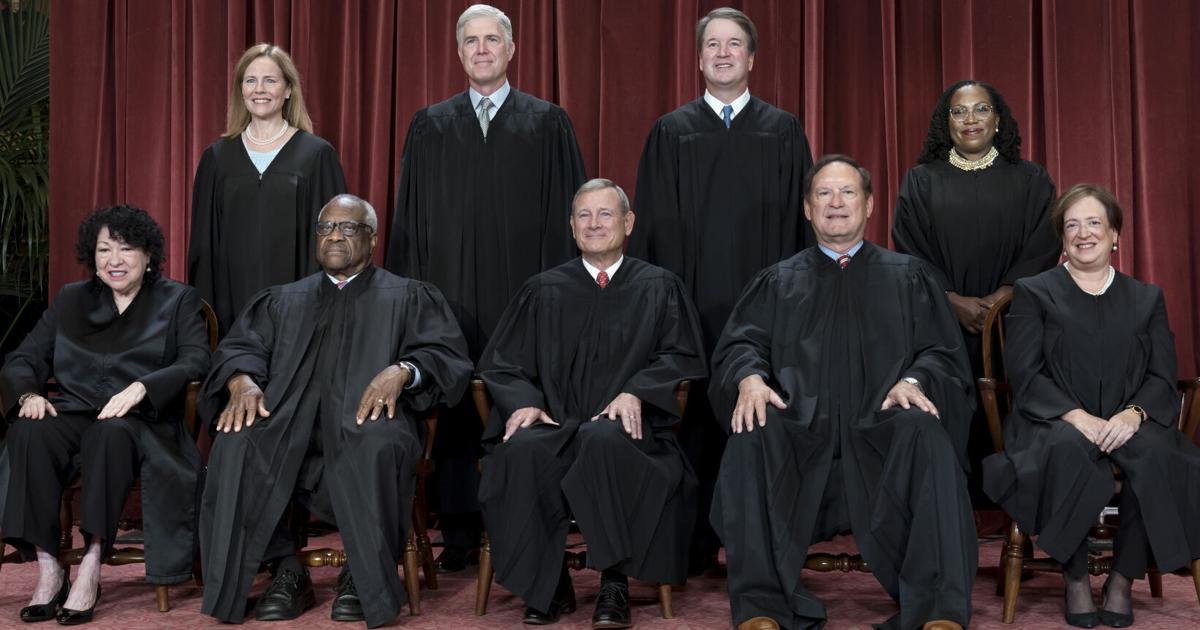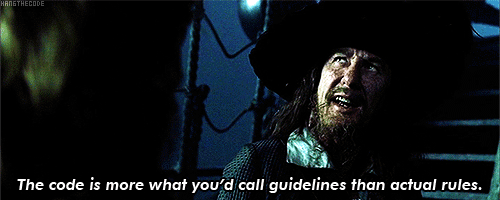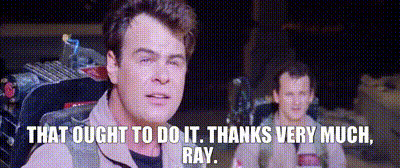About time!:
The Supreme Court is adopting its first code of ethics, in the face of sustained criticism over undisclosed trips and gifts from wealthy benefactors to some justices.
The policy was issued by the court Monday. The justices, who have hinted at internal deliberations over an ethics code, last met Thursday in their private conference room at the court.
FILE - The U.S Supreme Court is seen, Nov. 3, 2023, in Washington. The Supreme Court is adopting its first code of ethics, in the face of sustained criticism over undisclosed trips and gifts from wealthy benefactors to some justices. The policy was issued by the court Monday.
The issue has vexed the court for several months, over a series of stories questioning the ethical practices of the justices. Many of those stories focused on Justice Clarence Thomas and his failure to disclose travel and other financial ties with wealthy conservative donors including Harlan Crow and the Koch brothers. But Justices Samuel Alito and Sonia Sotomayor also have been under scrutiny.
Three justices, Amy Coney Barrett, Elena Kagan and Brett Kavanaugh, have voiced support for an ethics code in recent months. In May, Chief Justice John Roberts said there was more the court could do to "adhere to the highest ethical standards," without providing any specifics.
Public trust in and approval of the court is hovering near record lows, according to a Gallup Poll released just before the court's new term began on Oct. 2.
FILE - Members of the Supreme Court sit for a new group portrait following the addition of Associate Justice Ketanji Brown Jackson, at the Supreme Court building in Washington, Oct. 7, 2022. Bottom row, from left, Justice Sonia Sotomayor, Justice Clarence Thomas, Chief Justice John Roberts, Justice Samuel Alito, and Justice Elena Kagan. Top row, from left, Justice Amy Coney Barrett, Justice Neil Gorsuch, Justice Brett Kavanaugh, and Justice Ketanji Brown Jackson. The Supreme Court is adopting its first code of ethics, in the face of sustained criticism over undisclosed trips and gifts from wealthy benefactors to some justices. The policy was issued by the court Monday.
AP Photo/J. Scott Applewhite, File
As recently as last week, Sen. Dick Durbin, D-Ill., chairman of the Senate Judiciary Committee, said the justices could quiet some of the criticism and a Democratic push to impose an ethics code on the court by putting in place their own policy.
Durbin's panel has been planning to subpoena Crow and conservative activist Leonard Leo about their roles in organizing and paying for justices' luxury travel.
The committee has been investigating the court's ethics and passed an ethics code, though all 10 Republicans on the panel voted against it.
Republicans complained that Democrats were mostly reacting to decisions they didn't like from the conservative-dominated court, including overturning the nationwide right to an abortion.
The proposal would require that justices provide more information about potential conflicts of interest. It would allow impartial panels of judges to review justices' decisions not to step aside from cases and require public, written explanations about their decisions not to recuse. It would also seek to improve transparency around gifts received by justices and set up a process to investigate and enforce violations around required disclosures. The Democratic bill had little prospect of becoming law in the Republican-controlled House, much less the closely divided Senate.
The push for an ethics code was jump-started by a series of stories by the investigative news site ProPublica detailing the relationship between Crow and Thomas. Crow has for more than two decades paid for nearly annual vacations, purchased from Thomas and others the Georgia home in which the justice's mother still lives and helped pay for the private schooling for a relative.
ProPublica also reported on Alito's Alaskan fishing trip with a GOP donor, travel that Leo helped arrange. The Associated Press reported that Sotomayor, aided by her staff, has advanced sales of her books through college visits over the past decade.
The court's initial step on ethics, in the spring, did not mollify critics. Roberts declined an invitation from Durbin to testify before the Judiciary panel, but the chief justice provided a "Statement on Ethics Principles and Practices" signed by all nine justices that described the ethical rules they follow about travel, gifts and outside income.
The statement provided by Roberts said that the nine justices "reaffirm and restate foundational ethics principles and practices to which they subscribe in carrying out their responsibilities as Members of the Supreme Court of the United States."
The statement promised at least some small additional disclosure when one or more among them opts not to take part in a case. But the justices have been inconsistent in doing so since.

 nonpareilonline.com
nonpareilonline.com
The Supreme Court is adopting its first code of ethics, in the face of sustained criticism over undisclosed trips and gifts from wealthy benefactors to some justices.
The policy was issued by the court Monday. The justices, who have hinted at internal deliberations over an ethics code, last met Thursday in their private conference room at the court.
FILE - The U.S Supreme Court is seen, Nov. 3, 2023, in Washington. The Supreme Court is adopting its first code of ethics, in the face of sustained criticism over undisclosed trips and gifts from wealthy benefactors to some justices. The policy was issued by the court Monday.
The issue has vexed the court for several months, over a series of stories questioning the ethical practices of the justices. Many of those stories focused on Justice Clarence Thomas and his failure to disclose travel and other financial ties with wealthy conservative donors including Harlan Crow and the Koch brothers. But Justices Samuel Alito and Sonia Sotomayor also have been under scrutiny.
Three justices, Amy Coney Barrett, Elena Kagan and Brett Kavanaugh, have voiced support for an ethics code in recent months. In May, Chief Justice John Roberts said there was more the court could do to "adhere to the highest ethical standards," without providing any specifics.
Public trust in and approval of the court is hovering near record lows, according to a Gallup Poll released just before the court's new term began on Oct. 2.
FILE - Members of the Supreme Court sit for a new group portrait following the addition of Associate Justice Ketanji Brown Jackson, at the Supreme Court building in Washington, Oct. 7, 2022. Bottom row, from left, Justice Sonia Sotomayor, Justice Clarence Thomas, Chief Justice John Roberts, Justice Samuel Alito, and Justice Elena Kagan. Top row, from left, Justice Amy Coney Barrett, Justice Neil Gorsuch, Justice Brett Kavanaugh, and Justice Ketanji Brown Jackson. The Supreme Court is adopting its first code of ethics, in the face of sustained criticism over undisclosed trips and gifts from wealthy benefactors to some justices. The policy was issued by the court Monday.
AP Photo/J. Scott Applewhite, File
As recently as last week, Sen. Dick Durbin, D-Ill., chairman of the Senate Judiciary Committee, said the justices could quiet some of the criticism and a Democratic push to impose an ethics code on the court by putting in place their own policy.
Durbin's panel has been planning to subpoena Crow and conservative activist Leonard Leo about their roles in organizing and paying for justices' luxury travel.
The committee has been investigating the court's ethics and passed an ethics code, though all 10 Republicans on the panel voted against it.
Republicans complained that Democrats were mostly reacting to decisions they didn't like from the conservative-dominated court, including overturning the nationwide right to an abortion.
The proposal would require that justices provide more information about potential conflicts of interest. It would allow impartial panels of judges to review justices' decisions not to step aside from cases and require public, written explanations about their decisions not to recuse. It would also seek to improve transparency around gifts received by justices and set up a process to investigate and enforce violations around required disclosures. The Democratic bill had little prospect of becoming law in the Republican-controlled House, much less the closely divided Senate.
The push for an ethics code was jump-started by a series of stories by the investigative news site ProPublica detailing the relationship between Crow and Thomas. Crow has for more than two decades paid for nearly annual vacations, purchased from Thomas and others the Georgia home in which the justice's mother still lives and helped pay for the private schooling for a relative.
ProPublica also reported on Alito's Alaskan fishing trip with a GOP donor, travel that Leo helped arrange. The Associated Press reported that Sotomayor, aided by her staff, has advanced sales of her books through college visits over the past decade.
The court's initial step on ethics, in the spring, did not mollify critics. Roberts declined an invitation from Durbin to testify before the Judiciary panel, but the chief justice provided a "Statement on Ethics Principles and Practices" signed by all nine justices that described the ethical rules they follow about travel, gifts and outside income.
The statement provided by Roberts said that the nine justices "reaffirm and restate foundational ethics principles and practices to which they subscribe in carrying out their responsibilities as Members of the Supreme Court of the United States."
The statement promised at least some small additional disclosure when one or more among them opts not to take part in a case. But the justices have been inconsistent in doing so since.

The Supreme Court says it is adopting a code of ethics for the first time
The Supreme Court is adopting its first code of ethics, in the face of sustained criticism over undisclosed trips and gifts from wealthy benefactors to some justices.



